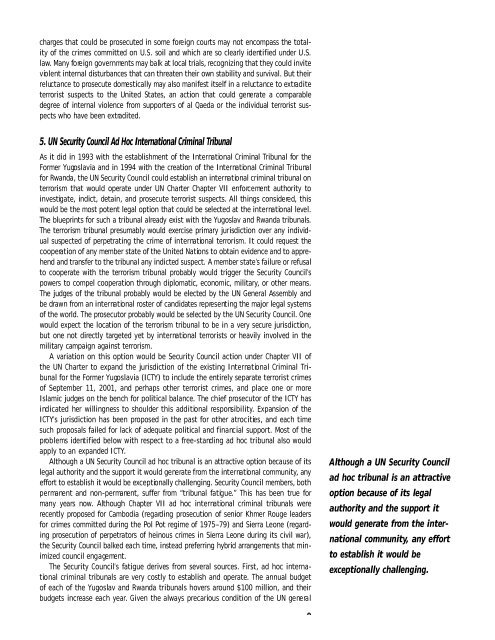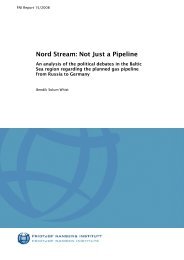David Scheffer Options for Pro secuting International Te r ro rists B ...
David Scheffer Options for Pro secuting International Te r ro rists B ...
David Scheffer Options for Pro secuting International Te r ro rists B ...
Create successful ePaper yourself
Turn your PDF publications into a flip-book with our unique Google optimized e-Paper software.
c h a rges that could be p<strong>ro</strong>secuted in some fo re ign courts may not encompass the totality<br />
of the crimes committed on U.S. soil and which are so clearly ide nt i f ied under U.S.<br />
l a w. Ma ny fo re ign go v e r n me nts may balk at local tria l s, re c o g n i z i ng that they could invite<br />
v io l e nt int e r nal disturbances that can threaten their own stability and survival. But the i r<br />
re l uc t a nce to p<strong>ro</strong>secute do me s t ically may also manifest itself in a re l uc t a nce to ex t ra d i t e<br />
t e r <strong>ro</strong>rist suspects to the United States, an action that could ge ne rate a compara b l e<br />
de g ree of int e r nal vio l e nce f<strong>ro</strong>m supporters of al Qaeda or the ind i v idual ter<strong>ro</strong>rist suspects<br />
who have been ex t ra d i t e d.<br />
5. UN Security Council Ad Hoc <st<strong>ro</strong>ng>International</st<strong>ro</strong>ng> Criminal Tr i b u n a l<br />
As it did in 1993 with the establishme nt of the Int e r na t io nal Criminal Tr i b u nal <st<strong>ro</strong>ng>for</st<strong>ro</strong>ng> the<br />
F o r mer Yu go s l a v ia and in 1994 with the cre a t ion of the Int e r na t io nal Criminal Tr i b u na l<br />
<st<strong>ro</strong>ng>for</st<strong>ro</strong>ng> Rwanda, the UN Security Council could establish an int e r na t io nal criminal tribunal on<br />
t e r <strong>ro</strong>rism that would operate under UN Charter Chapter VII enfo rc e me nt authority to<br />
i n v e s t ig a t e, ind ict, detain, and p<strong>ro</strong>secute ter<strong>ro</strong>rist suspects. All things cons ide re d, this<br />
would be the most potent legal option that could be selected at the int e r na t io nal level.<br />
T he blueprints <st<strong>ro</strong>ng>for</st<strong>ro</strong>ng> such a tribunal alre a dy exist with the Yu goslav and Rwanda tribuna l s.<br />
T he ter<strong>ro</strong>rism tribunal pre s u mably would exe rcise primary jurisdic t ion over any ind i v idual<br />
suspected of perpetra t i ng the crime of int e r na t io nal ter<strong>ro</strong>rism. It could request the<br />
c o o p e ra t ion of any member state of the United Na t io ns to obtain evide nce and to apprehe<br />
nd and tra nsfer to the tribunal any ind icted suspect. A member state’s fa i l u re or re f u s a l<br />
to cooperate with the ter<strong>ro</strong>rism tribunal p<strong>ro</strong>bably would trig ger the Security Counc i l ’ s<br />
powers to compel coopera t ion th<strong>ro</strong>ugh diploma t ic, econo m ic, military, or other me a ns.<br />
T he judges of the tribunal p<strong>ro</strong>bably would be elected by the UN Gene ral Assembly and<br />
be drawn f<strong>ro</strong>m an int e r na t io nal <strong>ro</strong>ster of cand idates re p re s e nt i ng the major legal systems<br />
of the world. The p<strong>ro</strong>secutor p<strong>ro</strong>bably would be selected by the UN Security Council. One<br />
would expect the location of the ter<strong>ro</strong>rism tribunal to be in a very secure jurisdic t io n ,<br />
but one not directly targeted yet by int e r na t io nal ter<strong>ro</strong><strong>rists</strong> or heavily involved in the<br />
military campaign against ter<strong>ro</strong> r i s m .<br />
A varia t ion on this option would be Security Council action under Chapter VII of<br />
t he UN Charter to ex p a nd the jurisdic t ion of the ex i s t i ng Int e r na t io nal Criminal Tr ib<br />
u nal <st<strong>ro</strong>ng>for</st<strong>ro</strong>ng> the Former Yu go s l a v ia (ICTY) to inc l ude the ent i rely separate ter<strong>ro</strong>rist crime s<br />
of September 11, 2001, and perhaps other ter<strong>ro</strong>rist crime s, and place one or mo re<br />
Is l a m ic judges on the bench <st<strong>ro</strong>ng>for</st<strong>ro</strong>ng> political balanc e. The chief p<strong>ro</strong>secutor of the ICTY has<br />
i nd icated her willing ness to sho u l der this add i t io nal re s p o ns i b i l i t y. Expans ion of the<br />
ICTY’s jurisdic t ion has been p<strong>ro</strong>posed in the past <st<strong>ro</strong>ng>for</st<strong>ro</strong>ng> other at<strong>ro</strong> c i t ie s, and each time<br />
s uch p<strong>ro</strong>posals failed <st<strong>ro</strong>ng>for</st<strong>ro</strong>ng> lack of ade q uate political and fina nc ial support. Most of the<br />
p <strong>ro</strong> b l e ms ide nt i f ied below with respect to a fre e - s t a nd i ng ad hoc tribunal also would<br />
apply to an ex p a nded IC T Y.<br />
A l t hough a UN Security Council ad hoc tribunal is an attractive option because of its<br />
legal authority and the support it would ge ne rate f<strong>ro</strong>m the int e r na t io nal commu n i t y, any<br />
e f <st<strong>ro</strong>ng>for</st<strong>ro</strong>ng>t to establish it would be exc e p t io nally challeng i ng. Security Council me m b e r s, both<br />
p e r ma ne nt and no n - p e r ma ne nt, suffer f<strong>ro</strong>m “tribunal fa t ig u e.” This has been true fo r<br />
ma ny years no w. Although Chapter VII ad hoc int e r na t io nal criminal tribunals were<br />
re c e ntly p<strong>ro</strong>posed <st<strong>ro</strong>ng>for</st<strong>ro</strong>ng> Cambodia (re g a rd i ng p<strong>ro</strong> s e c u t ion of senior Khmer Rouge leade r s<br />
<st<strong>ro</strong>ng>for</st<strong>ro</strong>ng> crimes committed du r i ng the Pol Pot re g i me of 1975–79) and Sie r ra Leone (re g a rdi<br />
ng p<strong>ro</strong> s e c u t ion of perpetrators of he i nous crimes in Sie r ra Leone du r i ng its civil war),<br />
t he Security Council balked each time, instead pre f e r r i ng hy b r id arra nge me nts that minimized<br />
council eng a ge me nt.<br />
T he Security Council’s fa t igue derives f<strong>ro</strong>m several sourc e s. First, ad hoc int e r nat<br />
io nal criminal tribunals are very costly to establish and opera t e. The annual budge t<br />
of each of the Yu goslav and Rwanda tribunals hovers a<strong>ro</strong> u nd $100 million, and the i r<br />
b udgets inc rease each year. Given the always pre c a r ious cond i t ion of the UN ge ne ra l<br />
9<br />
Although a UN Security Council<br />
ad hoc tribunal is an attra c t i ve<br />
option because of its legal<br />
authority and the support it<br />
would generate f<strong>ro</strong>m the inter-<br />
national community, any effo r t<br />
to establish it would be<br />
exceptionally challenging.













